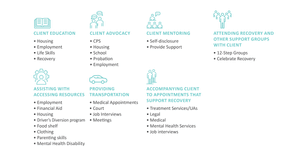Certified Peer Recovery Specialists (CPRSs) are professionals within the recovery community who utilize their lived experience to support their peers in recovery. CPRSs can advance to different positions within the peer recovery career track – becoming Reciprocals, Supervisors, Trainers and more. At Kyros, we employ CPRSs daily as we build a network of peers who are serving critical services in the community today. Many individuals in recovery are not aware that becoming a CPRS is possible for anyone in recovery, no matter what your past looks like. In an effort to spread awareness about this incredible opportunity, we reached out to one of our former CPRSs leads to give us some insight. In this post Jacques Blake shares what a typical day working as a CPRS and CPRS Supervisor looks like. A typical workday varies from peer to peer, keep reading to hear how Jacques works as a CPRS.
What is A CPRS?
A Certified Peer Recovery Specialist (CPRS) is an individual in recovery from Substance Use Disorder (SUD), or who has lived experience with addiction and works with peers on rebuilding their lives in recovery.
CPRSs are typically part of a larger care team, and work complimentary to other providers such as clinicians, counselors and more. CPRSs can provide a range of services to their clients based on what each individual needs. Below are some of the most common peer services that Kyros CPRSs offer to clients:

A Day in the Life of a CPRS
It’s important to note that a typical day of work may look different from one CPRS to the next. This is just one example. Jacques works with 8 clients, here is what his day looks like.
Administrative Tasks Starting his day, Jacques takes into account what’s on his calendar – who is he meeting with? How long are the client appointments? Are there any clients that need transportation? Jacques makes sure his calendar is updated, and that the day – and week – ahead reflect any changes that have come up. Staying organized is important, especially when you’re working with multiple clients who depend on you to show up.
Daily Check-Ins Jacques recommends touching base with each of his clients every day. Check-ins may vary in length depending on the clients needs.
Appointments It’s common for client appointments to be anywhere from 30 minutes to 2 hours in length. Circling back to administrative tasks, keeping your calendar updated will help you to manage the different appointments you have with your clients.
Resource Discovery Working as a CPRS means managing your own clients and consistently finding new resources to better serve those you are working with. Maybe you routinely check for recovery events happening in the area, or chat with other CPRSs to see which resources they provide to their clients. Jacques recommends dedicating a bit of time each day to find new resources to keep your supply growing!
A Few Pro Tips
- Take Care of Yourself First If you are struggling, your clients will struggle too. Your first priority is to take care of yourself, so that you can effectively support others. Continue to practice daily care, and lean on your own support team. Supervisors are here to support you, they are a great resource as you find your balance working as a CPRS.
- Lean on Your Supervisor Your CPRS Supervisor is there to support YOU as you grow into an effective CPRS. Learning all of the aspects of the job can be overwhelming, do not hesitate to turn to your supervisor for guidance. There are no dumb questions, and they have been in your shoes. Check in with your supervisor as often as you need.
- Keep Professionalism in Mind When you get your first client, you become a professional working in this industry. It’s extremely important to show up each day as the qualified professional that you are. This means being responsive, reliable, organized and on time. As mentioned before, reach out to your supervisor with any questions you may have about what professionalism looks like in this position.
- Compliance is Key There are rules and regulations in each state and it’s required that you follow them. As you onboard, you will be made aware of what compliance means on this career path. If we haven’t said it enough, we’ll say it once more – your supervisors are a great resource to lean on. Ensure that you’re remaining compliant and check in regularly.
You Write the Script
CPRSs have the unique opportunity to turn their lived experiences into a valuable asset. We value ALL experiences in recovery as every person’s unique experience has the potential to help clients in different ways. Working as a CPRS, you will have the unique opportunity to touch the lives of clients you work with as a Peer who has experienced a similar path. Be thoughtful in your approach, and create a balance that works for you. While this post only serves as one CPRSs experience on a day-to-day basis, we hope it offers some guidance as you begin working as a peer.
Start Working as a CPRS Now!
Ready to get started? Join the Kyros team and start supporting your peers in recovery today. Need training? We’ve got you covered – we partner with Refocus Recovery who offers a free 5-day training class every week. Find an available class here.





